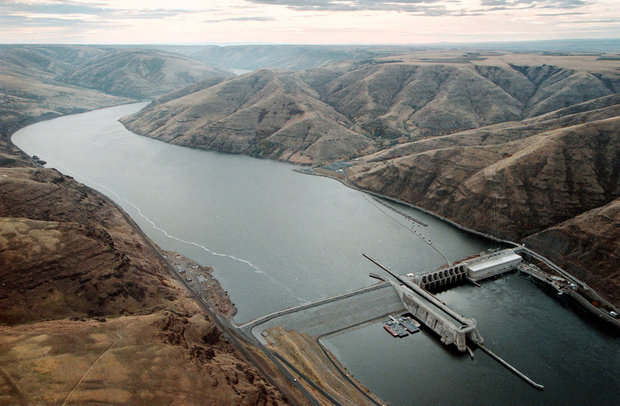forum
library
tutorial
contact

Inslee and Kitzhaber Can
Lead a Columbia Resolution
by Bryan Jones
The Olympian, June 7, 2012
|
the film forum library tutorial contact |

|
Inslee and Kitzhaber Can
by Bryan Jones
|
 For 12 years, Washington and Oregon have been on opposite sides of the Columbia Basin salmon deadlock. But Washington's new governor, Jay Inslee, is the right leader at the right time to partner with Oregon Gov. John Kitzhaber so the two states can lead the Northwest to shared and lasting solutions for salmon, energy and agriculture.
For 12 years, Washington and Oregon have been on opposite sides of the Columbia Basin salmon deadlock. But Washington's new governor, Jay Inslee, is the right leader at the right time to partner with Oregon Gov. John Kitzhaber so the two states can lead the Northwest to shared and lasting solutions for salmon, energy and agriculture.
Inslee's values and policies align with Kitzhaber's: clean water and healthy rivers, clean and affordable energy and efficient transportation infrastructure for our cities and farm -- along with the good jobs involved in meeting those goals. And Inslee brings a new leadership element to rebuilding the Columbia-Snake partnership with Oregon, his dual determination to stop climate change and to arm our state against its damage.
The two governors can build from a positive federal step. Last December, after years of contention and illegal salmon plans, National Oceanic and Atmospheric Administration chief Jane Lubchenco set her agency on a fresh course: exploring multi-party collaboration on the Columbia and Snake.
Just how this process will develop is the subject of interviews now underway with more than 150 Columbia-Snake stakeholders. But a stakeholder initiative will work only if Washington and Oregon actively support and shape it. All-party collaboration is the Northwest's best hope to break the legal, political and economic deadlock on the Columbia, and that hope becomes achievable once Washington and Oregon join to lead it.
Eastern Washington needs a resolution to this deadlock. The status quo is delivering neither healthy salmon or salmon economies nor the energy certainty that Inslee's clean energy and jobs goals require. Farmers need modern, reliable and affordable transportation options that are not constrained by the federal fiscal crisis.
Make no mistake: Climate disruption is happening and will intensify over time. The Columbia and Snake rivers are getting steadily hotter at the same time that runoff and flow patterns are changing. This affects fish, farmers, energy, health -- every use and every user.
Today, Washington and Oregon are on opposite sides of litigation over federal salmon plans, litigation that is both source and symptom of the deadlock. Reconciling the states' substantive disagreements may not be easy, but it must be tried. And even if policy disagreements persist, Inslee and Kitzhaber still can work together so diverse Columbia-Snake stakeholders talk and work with one another.
Inslee and Kitzhaber can put Washington and Oregon back in the driver's seat to make a successful collaboration happen that meets the needs of clean energy, farmers, fishermen and our communities in the Columbia-Snake Basin and the Northwest.
learn more on topics covered in the film
see the video
read the script
learn the songs
discussion forum
